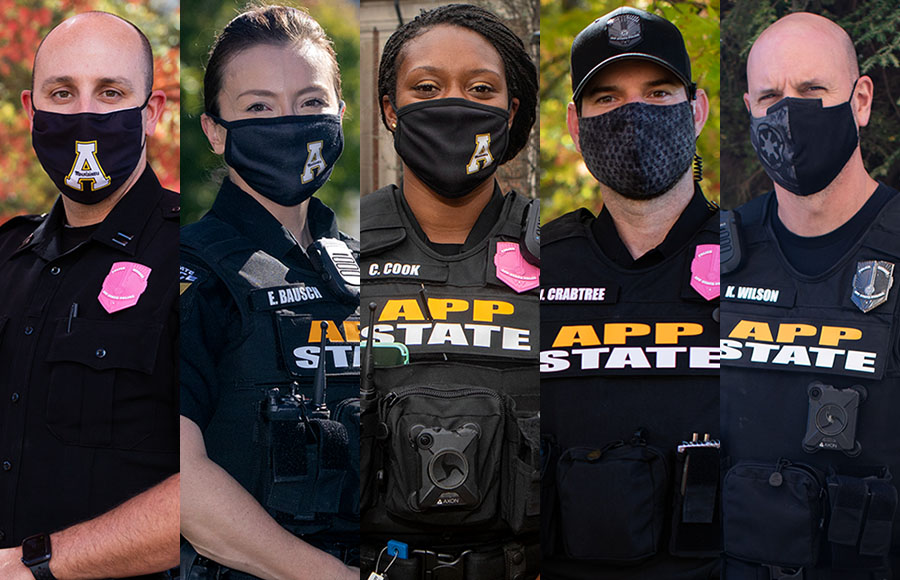
The Appalachian Police Department officers who participated in the implicit bias training hosted and sponsored by Appalachian State University Sept. 23–24 in Blowing Rock. Pictured, from left to right, are Johnny Brown, APD captain of operations; Emily Bausch, who also serves as the department’s public information officer and as a critical crisis communications specialist in App State’s University Communications; Cashae Cook; Jacob Crabtree; and Kevin Wilson. Photos by University Communications
BOONE, N.C. — Fifteen High Country police officers, including five members of the Appalachian Police Department (APD) — Appalachian State University’s official policing agency, are now certified to provide implicit bias training to other sworn officers and officers in training.
The officers earned their certification through the Train-the-Trainer program developed by Fair and Impartial Policing (FIP) LLC, which provides implicit bias training nationwide to law enforcement agencies at the local, state and federal levels. The program was hosted and sponsored by APD in September.
FIP defines implicit bias as “the attitudes or stereotypes that affect our understanding, actions and decisions in an unconscious manner.” The organization asserts that implicit bias affects everyone, working “outside of our conscious awareness and manifests even in people who consciously hold nonprejudiced attitudes.”
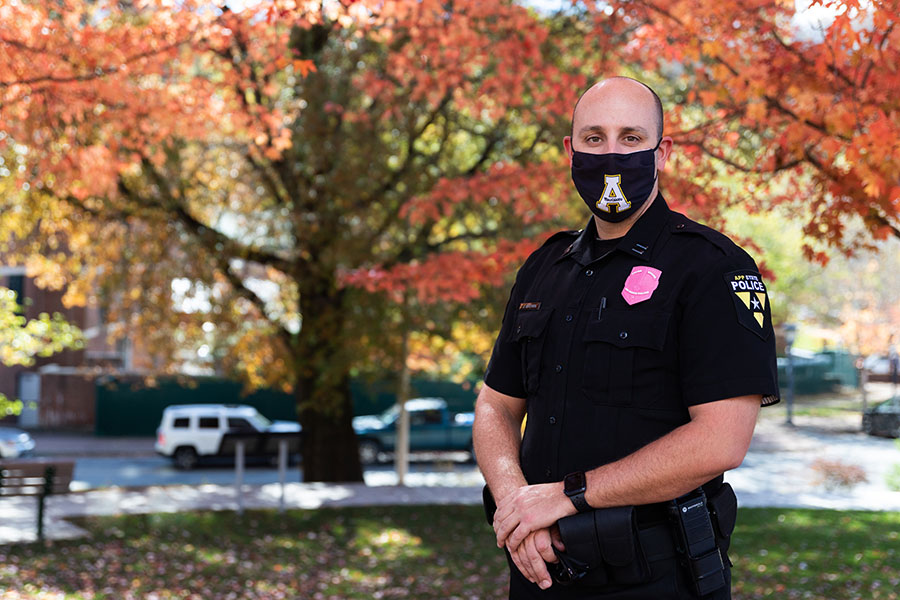
Johnny Brown, captain of operations for the Appalachian Police Department — Appalachian State University’s official policing agency. Brown, who has served with APD since 2002, is certified to train police to recognize and respond to implicit bias. He is an instructor in the Appalachian Police Academy and a SWAT team member. Photo by Chase Reynolds
The Fair and Impartial Policing curricula are tailored specifically to train police officers, their trainers and police supervisors — from the field level to the command level. Through the program, which provides participants with opportunities for self-reflection and to practice teaching the curriculum themselves, officers discuss implicit bias while being challenged to recognize how it can manifest in their professional work and that of their subordinates.
“When our officers and partner agencies both provide and participate in implicit bias training, we are helping to instill these lessons in our policing culture locally and regionally,” said Andy Stephenson, App State’s director of public safey and chief of police.
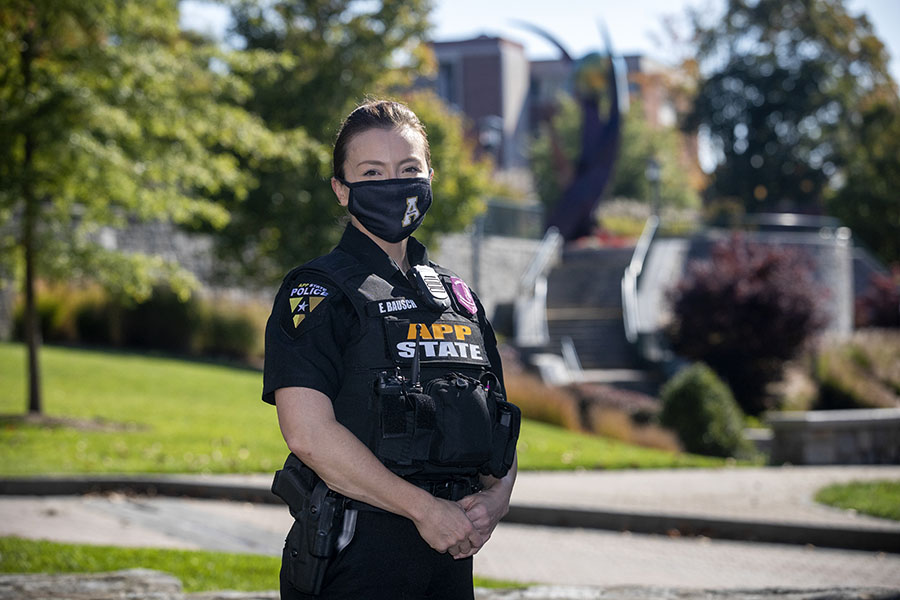
Officer Emily Bausch is a member of the Appalachian Police Department — Appalachian State University’s official policing agency — and is certified to train police to recognize and respond to implicit bias. She also serves as the department’s public information officer and as a critical crisis communications specialist in App State’s University Communications. Photo by Marie Freeman
Stephenson credits App State’s Chancellor Sheri Everts with providing the resources necessary for these types of training and officer development programs. Because of this commitment, says Stephenson, policing culture at App State and beyond is being redefined. “By offering this program to the greater Appalachian Community,” he said, “we are raising the bar for policing and our officers are becoming influential mentors and trainers.”
During training, officers explored the scientific evidence for implicit bias and its impact on professional performance, decisions and behavior, and developed skills to reduce and manage implicit biases. According to FIP’s Train-the-Trainer curricula, scientific research shows that modern bias is more likely to be implicit than explicit. Many of the officers said knowing biases come from outside of a person’s conscious awareness helps explain and overcome them.
Stephenson said implicit bias training is also offered to all new recruits in the Appalachian Police Academy. “Our officers, who are already important mentors to our student recruits, will now teach them some of the most critical skills they can have as police officers,” he said.
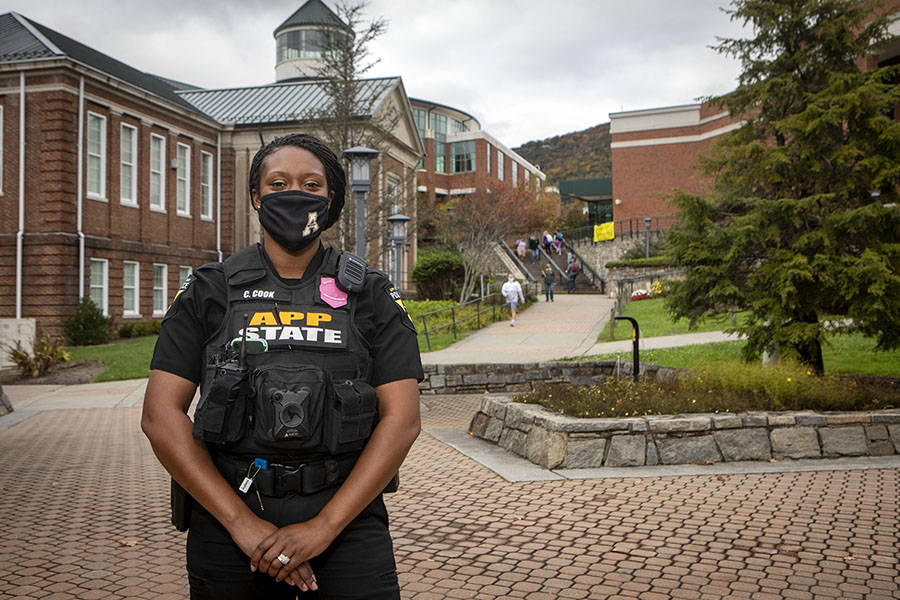
Officer Cashae Cook, a member of the Appalachian Police Department — Appalachian State University’s official policing agency. Cook, who joined APD in 2018, is certified to train police to recognize and respond to implicit bias. She is a graduate of the Appalachian Police Academy. Photo by Marie Freeman
Fair and Impartial Policing’s implicit bias training curricula have been integrated into the Leadership of Police Organizations and Women’s Leadership Institute training programs, both offered by the International Association of Chiefs of Police. The same curricula are also presented each year at the FBI National Academy and the Police Executive Research Forum’s Senior Management Institute for Police.
On completion of the Train-the-Trainer program, officers are certified to teach FIP’s courses to other police officers and officers’ direct supervisors for a period of two years before they are required to complete recertification.
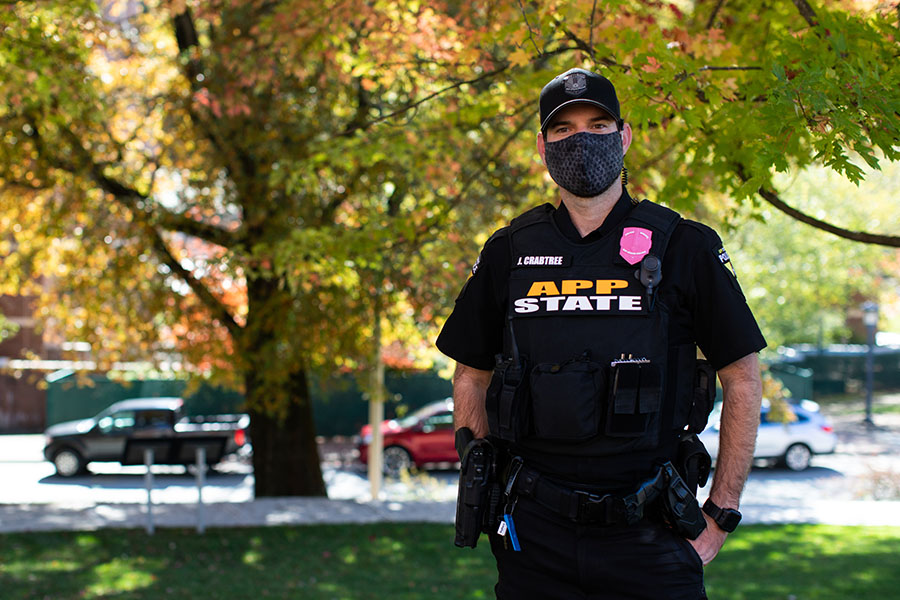
Officer Jacob Crabtree, a member of the Appalachian Police Department — Appalachian State University’s official policing agency. Crabtree, who has served with APD since 2016, is certified to train police to recognize and respond to implicit bias. He was sponsored by APD during his Basic Law Enforcement Training (BLET). Photo by Chase Reynolds
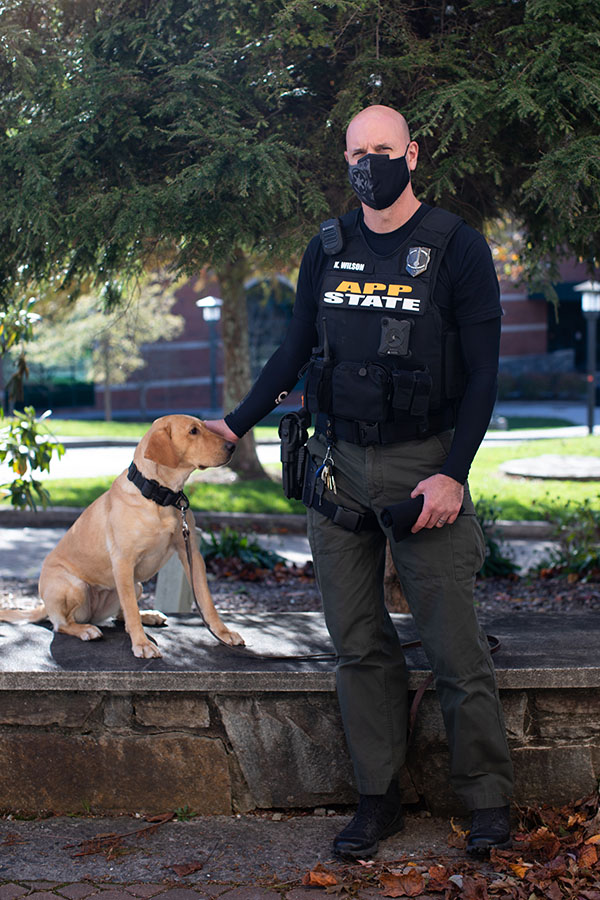
Officer Kevin Wilson and his K-9 partner, Yaya, both members of the Appalachian Police Department — Appalachian State University’s official policing agency. Wilson is certified to train police to recognize and respond to implicit bias. He served as a corporal and a K-9 officer with the Boone Police Department before joining APD in 2019. Photo by Chase Reynolds
The five APD officers who participated in the program are Capt. Johnny Brown, Officer Emily Bausch, Officer Cashae Cook, Officer Jacob Crabtree and K-9 Officer Kevin Wilson.
Upon completion of the program, Brown, Cook, Crabtree and Wilson shared their perceptions of the program’s benefits.
Brown, who serves as APD’s captain of operations, said, “My awareness of implicit biases is now a conscious thought in my decision-making. This allows me to police myself and have more open communications with my direct reports. Each decision I make as a supervisor should be thought out and applied to the same set of standards, and if employees know I am conscious of implicit bias, they will be more likely to discuss their concerns with me.”
Cook said, “I believe this training will allow our department to set a standard for other departments to also police in an unbiased manner.” She further explained, “It is imperative that police agencies communicate an expectation to their officers that policing that is influenced by implicit biases is unsafe and ineffective.”
Crabtree acknowledged the importance of both a long-term commitment and accountability. “Being aware of our implicit biases is a start, but simply knowing is not the same as applying it in every interaction we have with people,” he said. “Change won’t happen overnight, but I hope that the community continues to hold us accountable.”
Referencing the FIP curriculum that shares scientific evidence for implicit bias and its impact on professional performance, Wilson said, “I look forward to teaching the implicit bias class, especially being able to explain the science behind bias.”
What do you think?
Share your feedback on this story.
About the App State Police Department
Appalachian State University’s official policing agency — the App State Police Department — supports the university’s academic mission by working in partnership with the campus community to prevent crime, solve problems and improve the quality of life on campus. The department’s philosophy is one of proactive community engagement, collaboration and customer service, holding the safety and health of App State’s community members as its top priorities. State-certified police officers, security officers and civilian employees compose the department, and this team of professionals helps to create and maintain an inclusive sense of belonging for all members of the App State Community — students, faculty, staff and visitors. Additionally, through its efforts, the department aims to be a leader in innovative public safety ideas and strategies. Learn more at https://police.appstate.edu.
About Appalachian State University
As a premier public institution, Appalachian State University prepares students to lead purposeful lives. App State is one of 17 campuses in the University of North Carolina System, with a national reputation for innovative teaching and opening access to a high-quality, cost-effective education. The university enrolls more than 21,000 students, has a low student-to-faculty ratio and offers more than 150 undergraduate and 80 graduate majors at its Boone and Hickory campuses and through App State Online. Learn more at https://www.appstate.edu.
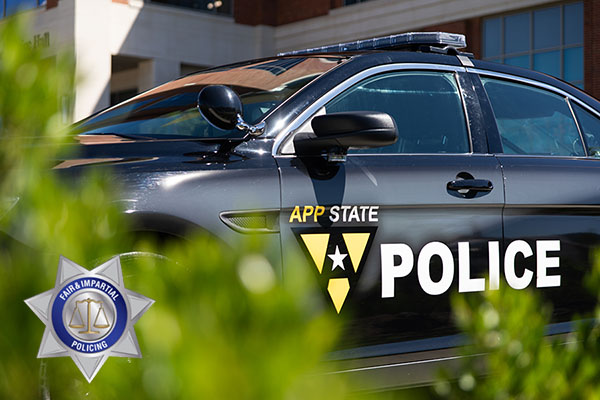
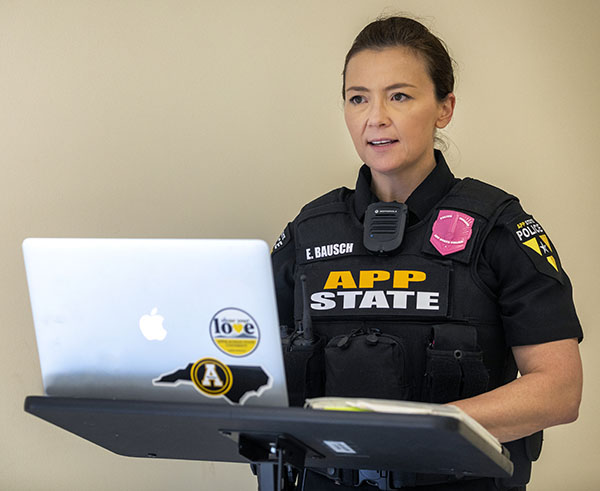
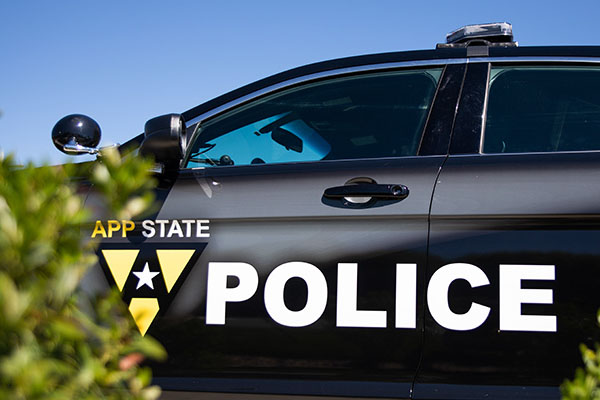
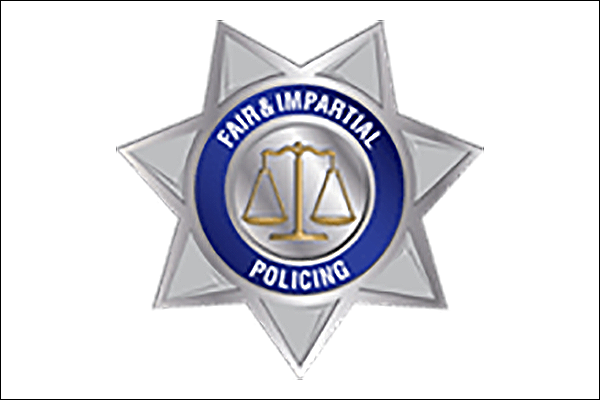


![How NCInnovation Is Rethinking Economic Development in North Carolina [faculty featured]](/_images/_posts/2026/02/rethinking-economic-development-600x400.jpg)








